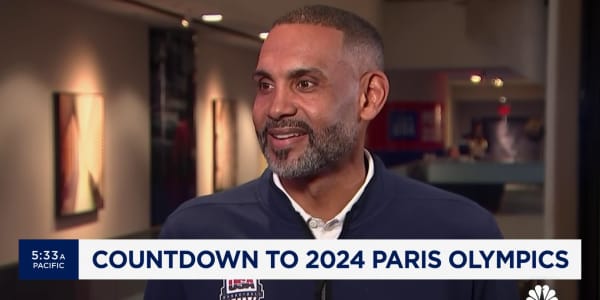At 83, it would be understandable if Jack Keep and Lew Ewing didn't feel like braving a long-haul flight to the sub-zero temperatures of South Korea's Pyeongchang.
But that's just what these two Americans, veterans of the 1950-1953 Korean War, did this week when they traveled to the 2018 Winter Olympics.
In 1951, 17-year-old Jack Keep enlisted in the U.S. Navy, and in early 1953 was assigned to Task Force 77 as a petty officer aboard a ship patrolling the North Korean coast.
That same year, Corporal Lewis Ewing was stationed at Chuncheon as a helicopter crew chief with the U.S. Army, responsible for maintaining the aircraft that sent supplies to troops on the ground and transported the wounded to hospitals.
Sixty-five years later, they've come back to the country where they once served to watch the games in Pyeongchang. For them, the international celebration of sports will also double as a showcase for the immense economic progress South Korea has undergone over the last six decades.
"I've never seen an Olympics firsthand, so I'm looking forward to the opening ceremony because that's always impressive. I'm just ready for whatever they give us the opportunity to see," Ewing told CNBC earlier this month over Skype from his home in Virginia.
"I'm too old to get giddy about things anymore," Keep said during the same call, laughing. "But it will be quite a thrill it be able to attend the Olympics."
This won't be the first time Ewing and Keep have returned to South Korea, traveling to the peninsula in 2006 and 2015, respectively, thanks to the Revisit Korea Program organized by the South Korean government to invite Korean War veterans back to the country.
Ewing recalled how Korea today contrasted with his first memories of the country.
"When we left Korea in the 1950s, the city of Seoul was total devastation, just nothing but rubble," he said. "The tallest building I remember seeing was taller than a one-story building, but it was all bombed out.
"Now today, Seoul is like any metropolitan city in the United States, high-rise buildings that go up forever. It's absolutely amazing the progress they've made over there in 60-plus years since the war. It shows you how hardworking and energetic the Korean people are and how they really won't give up."
"But also it's amazing how friendly they are," he added, "and how they show their appreciation to the American GI."
'The forgotten war'
For vets like Ewing and Keep, that appreciation is priceless.
"It means a lot to us, because when we came home from Korea, nobody knew where we were, or cared," Keep said.
"So most of us didn't talk about it much until recent years. We started having interactions with different groups of Korean organizations, and that's when we started thinking about it once again, and the people have always shown great appreciation for us."
The Korean War is often referred to as "the forgotten war" because of how little attention it received during and after the conflict. Korea did not galvanize U.S. popular support or protest the way World War II or Vietnam did. And when it began in 1950, then-U.S. President Harry Truman termed it a "police action," an undeclared military action under the auspices of the United Nations.
In the summer of 1950, communist North Korea invaded the South with the support of China and the Soviet Union, after the peninsula had already been split as a consequence of the Cold War. An international UN coalition of 16 countries came to the South's aid with the U.S. at the lead — Americans constituted 90 percent of the troops. They braved freezing temperatures in mountainous terrains, and many who survived lost fingers and limbs. But three years of a brutal war of attrition failed to elicit a surrender from either side.
By the time fighting ended in July 1953, nearly 34,000 U.S. forces had been killed, and the number of both North and South Korean casualties approached three million, the majority of whom were civilians. 7,747 Americans are still classified as missing in action.
An armistice was signed on July 27, 1953, but no peace agreement — meaning that the two countries are still officially at war. The Korean peninsula is split along the 38th Parallel North, the border that divided the U.S. and Soviet Union's respective administrations of the South and North just after World War II.
On the 38th Parallel sits the Demilitarized Zone, the most heavily-fortified border in the world, which still sees occasional flare-ups and sniper fire.
Enduring gratitude
South Koreans vocally attribute the freedom they have today to the war veterans' sacrifices, knowing that their democracy would not be possible had they been taken over by the communist North.
In 2010, on the war's 50th anniversary, South Korea's then-President Lee Myung-Bak wrote a letter to U.S.vets, saying: "Korea today is a vibrant democracy with a robust economy and we are actively promoting peace and stability around the world... We wish to dedicate these achievements to you."
"Since I've been with the Korean War Veterans Association, we have a lot of interactions with the Korean community here, so we've gotten to know the folks real well," Keep said. "We have a real love for them and they seem to love us as well."
"Korean ladies always like to have me over for lunch to test out some new recipe they have," he added with a laugh.
The 2018 Games are particularly significant for Keep and Ewing because they have spurred some diplomatic progress — it's the first time that North and South Korea will be competing in any event under a unified flag. Asked if they thought this might be a breakthrough for relations between the two adversaries, the vets were cautious but hopeful.
"Well, I think Ronald Reagan had it correct when he said 'trust and verify,' Keep said. "You know you can't trust the North Koreans, but I think we all hope that there'll be some loosening of relationships where they get to talking and maybe make it possible once again for families to visit across the line and things like that.
"I think it'll be a long, long time before everything cools down with the North, but we have some hopes."





